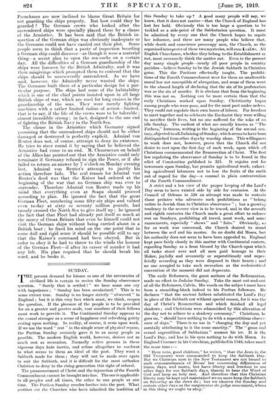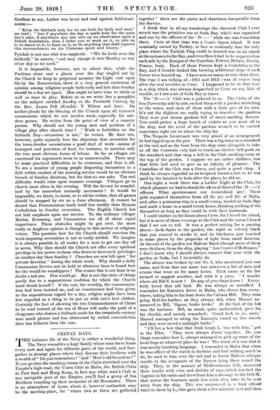SUNDAY. T HE present demand for leisure as one of the
necessaries of civilized life is certain to revive the Sunday observance question. "Surely that is settled ! " we hear some one cry with impatience ; "Sunday has been secularized." This is to some extent true. Sunday is no longer strictly " observed " in England ; but it is this very fact which must, we think, reopen the question. If the pleasure of the people is to be provided for on a greater and greater scale, vast numbers of their fellows must work to provide it. The Continental Sunday appears to the casual stranger as a scene of happiness and refreshing gaiety resting upon nothing. In reality, of course, it rests upon work. If we use the word " rest " in the simple sense of physical repose, the Puritan Sunday certainly gave it to as many people as possible. The modem English world, however, desires not so much rest as recreation. Normally active persons in these vigorous days hate inertia, and refuse altogether to conform to what seems to them an ideal of the past. They want a Sabbath made for them ; they will not be made over again to suit the Sabbath, and it is difficult for the most orthodox Christian to deny to the rising generation this right of refusal.
The pronouncement of Christ and the injunction of the Fourth Commandment cannot be brought into line. The one is applicable to all peoples and all times, the other to one people at one time. The Puritan Sunday recedes further into the past. What position are the Churches who have inherited the tradition of
this Sunday to take up ? A good many people will say, we know, that it does not matter—that the Church of England has lost her hold. Obviously this is too large a question to be
tackled as a side-point of the Sabbatarian question. It must be admitted by every one that the Church hopes to regain her influence, and there are many people who believe that, while death and conscience preoccupy men, the Church, as the organized interpreter of these two mysteries, will rem ii alive. All English Churchmen, whether they belong to the Establishment or not, must necessarily think the matter out. Even in the present
day many simple people—nearly all poor people in country parishes—believe Sunday to be the Jewish Sabbath in Christian guise. This the Puritans effectually taught. The prohibi-
tions of the Fourth Commandment were for them an unalterable moral law not susceptible of abrogation, and some of them went
to the absurd length of declaring that the sin of its profanation was as the sin of murder. It is obvious that from the beginning
this was not so. Nothing can be more certain than that the early Christians worked upon Sunday. Christianity began among people who were poor, and for the most part under orders. They could not regulate their own hours of labour. For freedom to meet together and to celebrate the Eucharist they were willing to sacrifice their lives, but no one suffered for the sake of an idle Sunday. The earliest of what are usually known as Fathers," Irenaeus, writing in the beginning of the second cen- tury, objected to all Judaizing of Sunday, which seems to have been distinguished from other days by worship alone. This willingness to work does not, however, prove that the Church did not desire to rest upon the first clay of each week, upon which all Christians commemorated the Resurrection of Christ. The first law regulating the observance of Sunday is to be found in the edict of Constantine published in 321. It enjoins rest for townsmen upon Sunday, but permits agricultural work, exhort- ing agricultural labourers not to lose the fruits of the earth out of regard for the day—a counsel in plain contravention of the Fourth Commandment.
A strict and a lax view of the proper keeping of the Lord's
Day seem to have existed side by side for centuries. At the Council of Orleans in 538 an attempt was made to restrain those prelates who advocate such prohibitions as " belong rather to Jewish than to Christian observance " ; but a growin.4 tendency to the severer view is to be traced, and in the seventh
and eighth centuries the Church made a great effort to enforce rest on Sundays, prohibiting all travel, most work, and sonic amusements, especially " shows " and "fairs." Obviously, sa far as work was concerned, the Church desired to stand between the serf and his master. So no doubt did Moses, but his authority does not seem to have been appealed to. England kept pace fairly closely in this matter with Continental custom, regarding Sunday as a feast blessed by the Church upon which all tasks stood over and all men paid homage to their Maker, joyfully and reverently or superstitiously and super- ficially according as they were disposed in their hearts ; and no one scrupled to take such recreation as the ecclesiastical convention of the moment did not deprecate.
The early Reformers, the great authors of the Reformation, made no effort to Judaize Sunday. Take the most out-and-out of all the Reformers, Calvin. His words on the subjec t must have been a stumbling-block indeed to his Puritan followers. He declares "that the ancient fathers substituted the Lord's Day in place of the Sabbath not without special reason, for it was the day of Christ's Resurrection and which finished all legal shadows ; and Christians were admonished by this alteration of the day not to adhere to a shadowy ceremony." Christians, he goes on, "should have nothing to do with a superstitious observ- ance of days." There is no use in "changing the day and yet mentally attributing to it the same sanctity." The "gross and carnal superstition of Sabbatism " arouses his ire. It is the Lord's Day, and has in his eyes nothing to do with Moses. In England Crammer in his Catechism, published in 1548, takes much the same tone :—
"Here note, good children," he writes, " that the Jews in the Old Testament were commanded to keep the Sabbath Day. But we Christian men in the New Testament are not bound to such commandments of Moses' law concerning differences of times, days, and meats, but have liberty and freedom to use other days for our Sabbath days, therein to hear the Word of God and keep an holy rest. And therefore that this Christian liberty may be kept and maintained we no more keep the Sabbath on Saturday as the Jews do ; but we observe the Sunday and certain other days as the magistrates do judge convenient, whom in this thing we ought to obey." Needless to say, Luther was heart and soul against Sabbatari- anism :—
" Keep the Sabbath holy for its use both for body and soul," we read ; "but if anywhere the day is made holy for the mere day's sake, if anywhere any one sets up its observance upon a Jewish foundation, then I order you to work on it, to ride on it, to dance on it, to feast on it, to do anything that shall reprove this encroachment on the Christian spirit and liberty." Tyndale is not one whit leas emphatic. "We be lords over the Sabbath," he asserts, "and may change it into Monday or any other day as we need."
It is impossible, however, not to admit that, while the Puritans alone cast a gloom over the day singled out by the Church to keep in perpetual memory the Light cast upon life by the Resurrection, there is a very general consensus of opinion among religious people both early and late that Sunday should be a day set apart. Men ought to have time to think as well as time to play. Before us as we write lies a pamphlet on the subject entitled Sunday in the Twentieth Century, by the Rev. James Fell (Kendal: T. Wilson and Son). Its author pleads for the blessing of the Church upon all innocent amusements which do not involve work, especially for out- door games. He writes from the point of view of a country parson. Why should not the young men and maidens of a village play after church time ? "Work is forbidden on the Sabbath Day—recreation is not," he writes. He does not, however, quite squarely face the objection that recreation for the town-dweller necessitates a good deal of work—means of transport and provision of food, for instance, to mention only the two most obvious forms of labour. So far as villages are concerned his arguments seem to us unanswerable. There may be some practical difficulties to be overcome, and that is all.
To see a number of young people disporting themselves in a field within earshot of the morning service would be an obvious breach of Sunday decorum, but for that no one asks. The real difficulty would arise upon summer evenings. Villagers go to church most often in the evening. Will the devout be scandal- ized by the somewhat untimely merriment ? It would be impossible, we think, to insist, or to advise rather, that all games should be stopped by six on a June afternoon. It cannot be denied that Protestantism lends itself less readily than Roman Catholicism to Sunday recreation. The English Church has not laid emphasis upon one service. To the ordinary villager Matins, Evensong, and Communion are all of about equal importance. These obstacles might be got over, the more easily as Anglican opinion is changing in this matter of religious values. The question how far the Church should sanction the work-imposing recreations is not so easily settled. We imagine it is always possible in all trades for a man to get one day off in seven. Why then should the Church not offer every spiritual privilege in her power to those who desire to have such privileges on another day than Sunday ? Churches are now left open "for private devotion" during the whole week. Why should a daily Communion Service not be held at whatever hour is found best for the would-be worshippers ? The reason this is not done is no doubt a sad one. Few would go. But is not this state of things partly due to a superstitious tradition for which the Church must thank herself ? If the rest, the worship, the commemora- tion had been insisted on, and no countenance had been given to the superstitious regard for a day, religion might have been less regarded as a thing to be put on with one's best clothes. Certainly the fact of allowing the two Commandments of Christ to be read instead of the ten of Moses will make the path of a clergyman who desires a Sabbath made for the twentieth-century man much plainer and less obstructed by verbal contradiction than has hitherto been the ease.







































 Previous page
Previous page